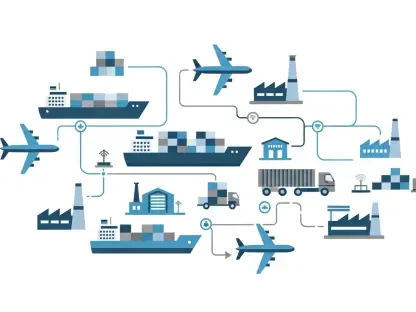In a transformative move within the logistics industry, DSV has completed the €14.3 billion acquisition of Schenker, positioning itself as the world’s largest airfreight forwarder. This merger combines the capabilities and strengths of the two companies, creating a formidable entity in global logistics. The alignment of their business models, services, and strategies is expected to enhance operational efficiencies and market reach. The newly combined company is projected to achieve pro forma revenue of Dkr310 billion, employing nearly 160,000 individuals across more than 90 countries. This development reflects DSV’s ambitious strategy to leverage economies of scale and strengthen its competitive stance in the rapidly evolving logistics landscape.
Market Volatility and Strategic Adjustments
Airfreight Performance
Despite its expansion to become a leading player, DSV’s airfreight volumes in the first quarter remained flat at 334,000 tonnes, diverging from the broader market trend that shows around 2.4% growth, as noted by IATA. Despite stagnant volumes, DSV managed to achieve a 12% increase in air revenues to Dkr13.6 billion, driven primarily by high rates from Asia Pacific to Europe. Contributing to this revenue growth, gross profits rose 5.6% to Dkr3.1 billion, indicating a strategic shift in logistics and pricing tactics. DSV attributed its volume stagnation to last year’s low-yielding volumes, alongside a strategic pivot towards sea freight due to advantageous pricing conditions. The disparities in cost between air and sea freight—especially during peak periods such as the Chinese New Year—have incentivized this shift.
Competitive Landscape
In contrast, rival logistics company Kuehne+Nagel reported a 5% increase in air cargo volumes, placing emphasis on DSV’s underperformance amid the volatile market dynamics. Kuehne+Nagel’s growth underscores the complex competitive environment, particularly in sectors excluding e-commerce and perishables. Nonetheless, DSV demonstrated solid financial health through an overall revenue increase of 8.7% to Dkr41.7 billion, and EBIT growth of 6% to Dkr3.7 billion, with profits escalating by 17.5% to Dkr2.8 billion. These gains were largely attributed to enhanced freight rates coupled with offering value-added services, which provided a cushion against fluctuating market demands.
Future Prospects and Anticipated Challenges
Industry Outlook
Looking beyond immediate market adjustments, DSV anticipates facing ongoing challenges from persistent global trade tensions and subdued macroeconomic indicators, which could dampen growth prospects in air and sea volumes relative to GDP forecasts. With uncertainties in the geopolitical landscape projected to persist, logistics operations must adapt to these potential constraints. However, optimism remains in sectors like technology, which continue to exhibit promising momentum for airfreight applications, suggesting a nuanced spectrum of impacts across industries. This narrative reveals DSV’s strategic foresight and preparedness to navigate market complexities, underscoring the merger’s potential to reinforce its resilience amidst shifting global conditions.
Strategic Positioning
DSV’s strategic positioning following the merger highlights its commitment to maximizing merger benefits despite prevailing airfreight market challenges. The alignment of operational and business strategies provides an opportunity to enhance service delivery and economic competitiveness. Embracing the challenges, DSV intends to leverage innovations and technological advancements to streamline operations and create value across its extensive network. As the logistics industry evolves, DSV remains poised to capitalize on emerging opportunities, ensuring it remains agile and responsive to market demands. This strategic approach reflects an overarching vision aimed at solidifying DSV’s leading role in a dynamic and interconnected global trade ecosystem.
Conclusion: Navigating New Horizons
In a significant reshaping of the logistics sector, DSV has finalized its €14.3 billion acquisition of Schenker, cementing its position as the premier airfreight forwarder globally. This merger creates a powerhouse in international logistics, merging the strengths and capabilities of both entities into a singular robust force. The synergy of their business models, services, and strategic approaches is poised to boost operational efficiencies and expand market presence considerably. The newly formed company anticipates a pro forma revenue generation of Dkr310 billion, employing an impressive workforce of nearly 160,000 across more than 90 countries. This bold move underscores DSV’s strategic vision to harness economies of scale and bolster its competitive edge in a fast-paced logistics landscape. The acquisition is a testament to DSV’s determination to evolve and adapt in response to dynamic global market trends, positioning itself for long-term success and growth.









